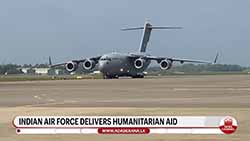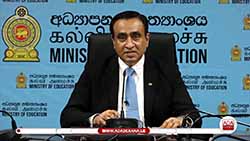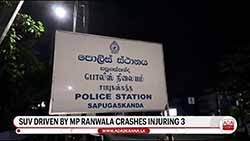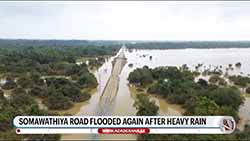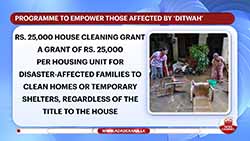Tamil Tigers on trial: controversial screening of C4 video
September 17, 2011 10:06 am
The Dutch prosecution of five Sri Lankan Tamils continues in The Hague in a trial which now promises to drag Dutch criminal law into conflict with the Sri Lankan government.
On a day bogged down by the virtually lone voice of Judge Van Rossum reading out witness testimonies gathered from Sri Lanka and neighbouring countries, defence counsel Victor Koppe sparked the potential for controversy by requesting the screening of British Channel 4’s “Sri Lanka’s Killing Fields” documentary. It will be viewed by the court today (September 16).
The film alleges that the government of Sri Lanka committed war crimes in the last phase of the country’s 30 year civil war. Victor Koppe described the film as being an “important source of information on the conflict.”
The Sri Lankan government has refuted the authenticity of the programme’s evidence since its broadcast in June, calling it “fabricated”.
‘Killing Fields’ screening
International pressure on the Sri Lankan government to properly address allegations that its military committed atrocities in the closing months of the war in 2009 has been intensifying in recent months. Rights groups, western governments and the UN have all made clear there must be transparency and a mechanism for justice put in place for the thousands of victims of the 2009 violence. Showing the best known contribution from the western media in a Dutch Criminal court could further legitimise those demands.
Speaking to RNW in his office at the Sri Lanka Embassy, Ambassador Buddhi Athauda, called the planned screening unfair. ‘They play the emotional card in a legal case. And the video is a fraud, it’s a PR clip from the LTTE (Tamil Tigers), it’s wrong... we intend to make a formal request not to show the video in court,’ he said.
One further course of action is for the Sri Lankan authorities to request the court also screens a film it commissioned and quickly produced this summer as a rebuttal to the Channel 4 film called “Lies Agreed Upon”. Asked whether the screening of this film would be considered, the Dutch prosecution in the current case seemed unprepared and undecided.
The current trial
Meanwhile back on the first day at the Paleis van Justitie in the centre of The Hague, the accused listen to witness testimonies through interpreters. Judge Van Rossum reads out a letter from one defendant claiming that the funds he raised were for humanitarian aid – helping the victims of war in Sri Lanka.
There were barely half a dozen Tamils present in the courtroom’s public gallery – this is surprising given the typical vociferousness of the Sri Lankan diaspora in all matters relating to the Tamil Tigers. One Tamil supporter present, who wished to remain unnamed, complained that, ‘All Dutch Tamils received a letter from the police when they were investigating this case.’
The letter contained information about the nature of the investigation and warned Tamils they were under the close watch of the Dutch police. ‘Many of us felt intimidated, so most people don’t really dare to show up here together in public.’
The case continues. (Radio Netherlands Worldwide)
On a day bogged down by the virtually lone voice of Judge Van Rossum reading out witness testimonies gathered from Sri Lanka and neighbouring countries, defence counsel Victor Koppe sparked the potential for controversy by requesting the screening of British Channel 4’s “Sri Lanka’s Killing Fields” documentary. It will be viewed by the court today (September 16).
The film alleges that the government of Sri Lanka committed war crimes in the last phase of the country’s 30 year civil war. Victor Koppe described the film as being an “important source of information on the conflict.”
The Sri Lankan government has refuted the authenticity of the programme’s evidence since its broadcast in June, calling it “fabricated”.
‘Killing Fields’ screening
International pressure on the Sri Lankan government to properly address allegations that its military committed atrocities in the closing months of the war in 2009 has been intensifying in recent months. Rights groups, western governments and the UN have all made clear there must be transparency and a mechanism for justice put in place for the thousands of victims of the 2009 violence. Showing the best known contribution from the western media in a Dutch Criminal court could further legitimise those demands.
Speaking to RNW in his office at the Sri Lanka Embassy, Ambassador Buddhi Athauda, called the planned screening unfair. ‘They play the emotional card in a legal case. And the video is a fraud, it’s a PR clip from the LTTE (Tamil Tigers), it’s wrong... we intend to make a formal request not to show the video in court,’ he said.
One further course of action is for the Sri Lankan authorities to request the court also screens a film it commissioned and quickly produced this summer as a rebuttal to the Channel 4 film called “Lies Agreed Upon”. Asked whether the screening of this film would be considered, the Dutch prosecution in the current case seemed unprepared and undecided.
The current trial
Meanwhile back on the first day at the Paleis van Justitie in the centre of The Hague, the accused listen to witness testimonies through interpreters. Judge Van Rossum reads out a letter from one defendant claiming that the funds he raised were for humanitarian aid – helping the victims of war in Sri Lanka.
There were barely half a dozen Tamils present in the courtroom’s public gallery – this is surprising given the typical vociferousness of the Sri Lankan diaspora in all matters relating to the Tamil Tigers. One Tamil supporter present, who wished to remain unnamed, complained that, ‘All Dutch Tamils received a letter from the police when they were investigating this case.’
The letter contained information about the nature of the investigation and warned Tamils they were under the close watch of the Dutch police. ‘Many of us felt intimidated, so most people don’t really dare to show up here together in public.’
The case continues. (Radio Netherlands Worldwide)






